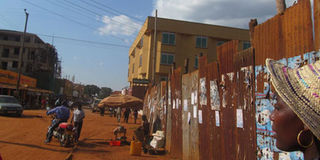Hoima dirtiest town in Uganda

Hoima town pictured recently. File photo
What you need to know:
- Civil Society Budget and Advocacy Group (CSBAG)’s executive director, Julius Bakunda, said there was limited space provided for CSOs interaction coupled with limited knowledge and understanding of the audit process.
- CSBAG recommended for online publishing of the audit reports but also ensuring that the reports are printed in hard copies since most areas of the country are still ignorant on internet usage.
KAMPALA. Director of Value for Money at Office of the Auditor General (OAG), Mr Stephen Kateregga, has revealed that Hoima Municipality is the dirtiest town in Uganda.
Mr Kateregga, while citing excerpts of the report on how Local Governments use funds allocated to them, said Hoima town tops the list of dirtiest town in Uganda followed by Tororo and Gulu Municipalities.
He said Hoima collects only 8.5 percent of the garbage on streets whereas Tororo and Gulu collect only 20 percent of their garbage leaving the rest to rot on streets.
“Management of solid waste by municipal authorities is every demanding. None of the municipalities is able to manage waste in a satisfactory manner,” Mr Kateregga said on Wednesday.
Mr Kateregga said towns in Uganda are able to collect only 40 percent of their garbage whereas 60 percent either rots on streets or perhaps gets washed away by running water up to wetlands and nearby rivers.
“There are a number of factors we found contributing to the poor solid waste management in municipalities and these range from lack of solid waste management policies and bye-laws,” he said.
Other causes of poor solid waste management include lack of stringent penalties to people operating business without waste collection centres or disposal bins and lack of clear guidelines on recruiting and hiring garbage collectors.
“Poor solid waste management puts our environment at stake because much of this garbage ends up in wetlands and other water sources. There is need for municipalities to improve on waste management mechanisms,” Mr Kateregga added.
Civil Society Budget and Advocacy Group (CSBAG)’s executive director, Julius Bakunda, said there was limited space provided for CSOs interaction coupled with limited knowledge and understanding of the audit process.
“Whereas citizens play an important role in ensuring government to deliver quality services. We seem to see less citizens’ involvement during the auditing process. We need to know the appropriate levels and time for citizens to engage in audit processes,” Mr Bakunda said.
CSBAG recommended for online publishing of the audit reports but also ensuring that the reports are printed in hard copies since most areas of the country are still ignorant on internet usage.



